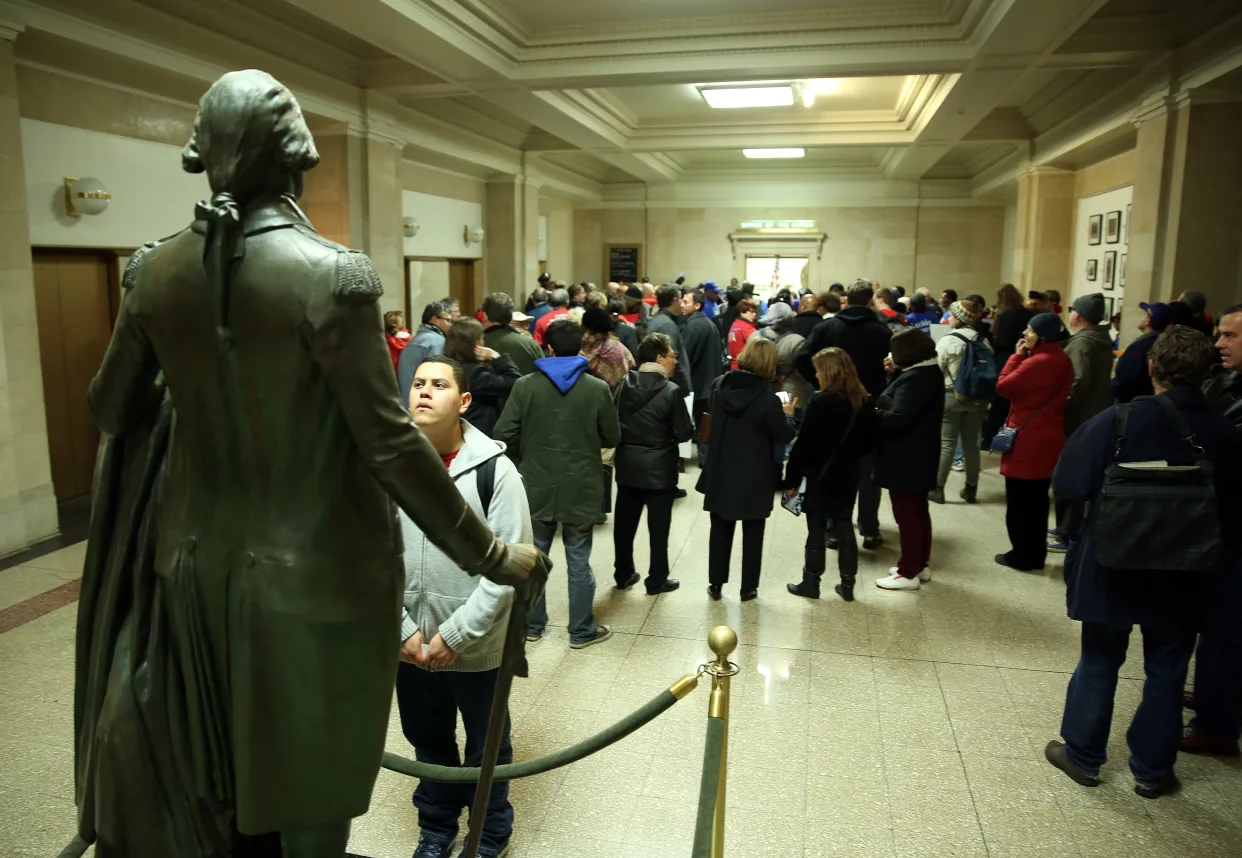Mayor Brandon Johnson’s administration had planned to remove the George Washington statue from outside the mayor’s office, his spokesman confirmed Tuesday while hinting at instead honoring a Black Chicagoan with a City Hall display.
But late in the evening, a mayoral critic who chairs the City Council’s Cultural Affairs Committee told the Tribune that the administration is reversing course. Ald. Nicholas Sposato, 38th, said Johnson senior advisor Jason Lee appeared to blame the confusion on Johnson’s predecessor, Lori Lightfoot.
“He said they never wanted to do it. It was some sort of ‘snafu’ from the previous administration,” Sposato told the Tribune. “I was just happy it was not coming down, so I didn’t start asking questions or criticizing or anything.”
In a Tuesday night text, Lee said he heard about the potential removal of the statue Tuesday, but when he checked with mayoral staffers was told it would not be moved. “I have no further information (about its) relationship with another administration … Just accepted the answer and moved on,” Lee said.
Mayoral spokesman Ronnie Reese did not respond to questions Tuesday night about the decision not to move the statue.
Fielding questions at an unrelated news conference after reports of the statue’s impending removal, the mayor would not address his reasoning or explain plans for a replacement. But Reese later told the Tribune that the statue would be moved because “we’re just making some updates to some areas in and around City Hall.”
Reese denied the reason was because of the first president’s legacy of owning slaves: “No, it’s literally just moving a statue.”
Reese did not answer questions about when it would be moved, the cost of the move or the fate of the Washington statue, which he said was on loan from the Art Institute of Chicago and remained in City Hall late Tuesday afternoon.
But he floated names of local Black historical figures as alternatives, among them Ida B. Wells, Jean Baptiste Point DuSable and Harold Washington — the city’s first Black mayor whom Johnson invoked throughout his mayoral campaign.
“In terms of monuments, there’s a few other individuals that we can consider: Chicagoans, people who are historic in the city and the history of this city, we should continue to consider for statues,” Reese said. “How about a statue for some of the fallen leaders in the 1919 race riots, right? … There’s a long legacy of famous African Americans, famous Americans from the city that we could be honoring.”
Johnson ally Ald. Carlos Ramirez-Rosa, 35th, added to the Tribune Tuesday that he and Reese support the creation of a public space to hold existing monuments to controversial figures, similar to Hungary’s Memento Park of fallen statues of leaders from the nation’s Communist period. He said the Christopher Columbus statues taken down during Lightfoot’s administration as well as other monuments recommended for removal could go in that space.
“I mentioned this idea in passing to the administration as a suggestion of what could be done with statues, and I’m glad that Mr. Reese likes the idea,” Ramirez-Rosa said, without commenting on the Washington statue.
The pending removal of a statue to the first president outside Johnson’s office reflects an ongoing nod from the progressive mayor, a former social studies teacher, to revisit which historical figures get memorialized by city government. That’s a conversation that has long been a subject of spirited debate across the country, including in Chicago, but gained prominence during the 2020 national reckoning on race in America.
Lightfoot removed the Columbus statue in Grant Park after a bloody clash took place there that summer but punted the fate of that statue and others to a monuments commission, which recommended in 2022 that other historical figures’ statues be scrutinized as well. The City Hall’s George Washington statue is not in the report.
Those recommendations have sat untouched under Johnson, but he has sought to make his own mark on reinventing Chicago’s philosophy toward monuments. Last summer he announced the city will spend $6.8 million in grant money on eight new monuments, including a memorial for police torture victims.
As Cook County commissioner, Johnson led a charge to rename the county’s Columbus Day holiday to Indigenous Peoples Day but the effort fizzled when another commissioner revealed he was descended from Freedmen, or Black Americans who were owned as slaves by indigenous people.
